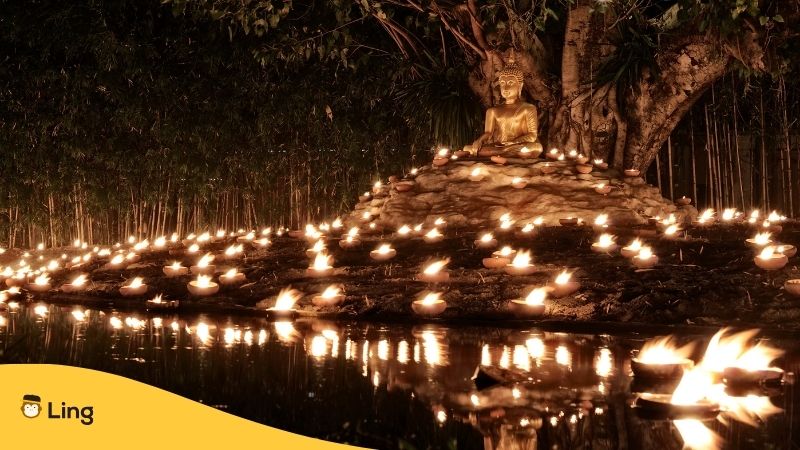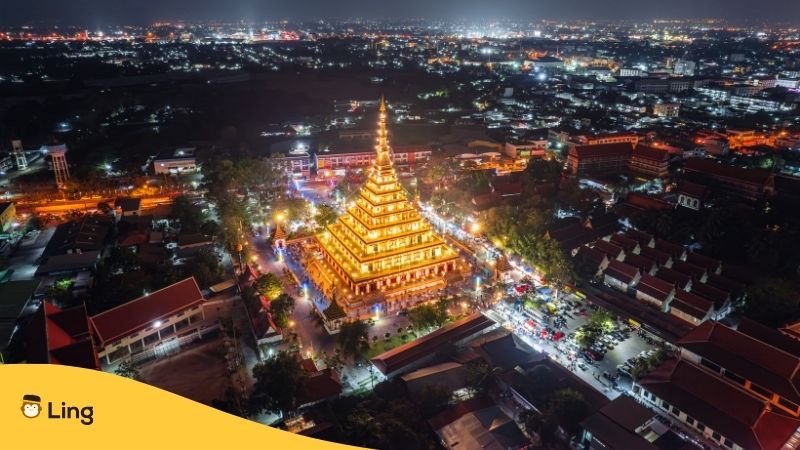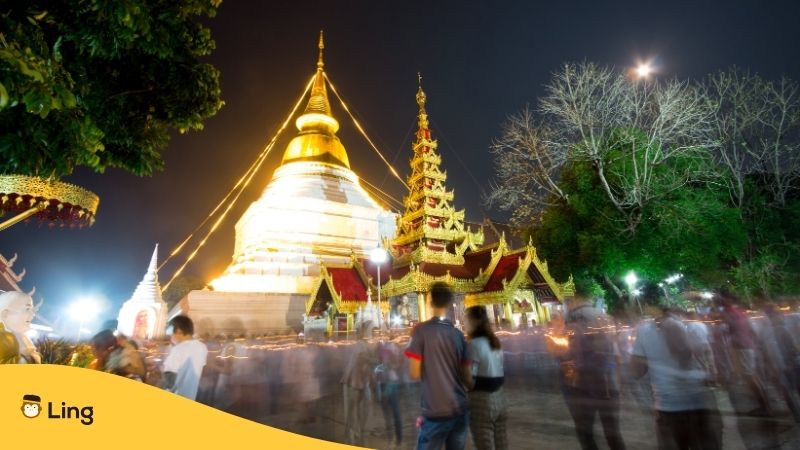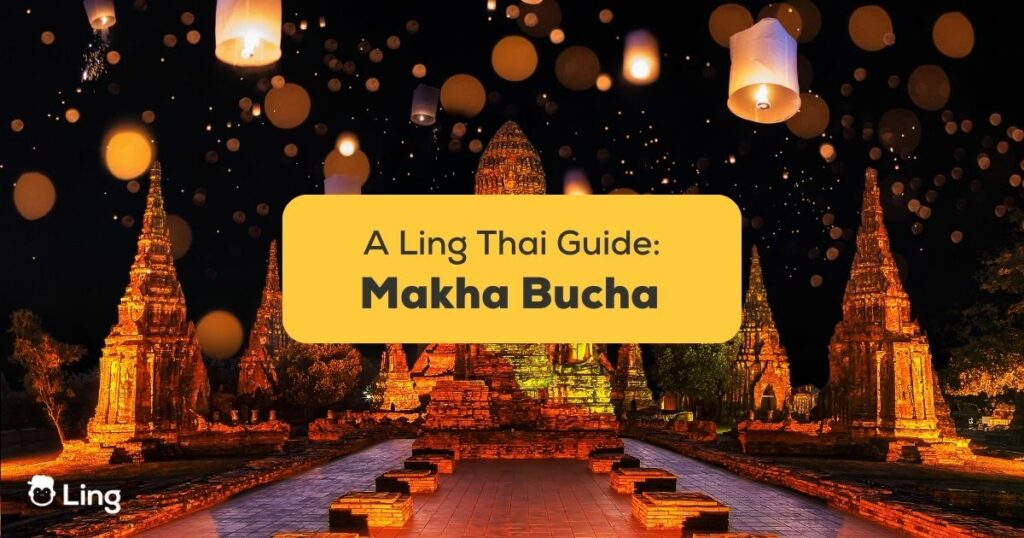Makha Bucha Thailand – now that’s a holiday every expat and tourist visiting the Land of Smiles needs to experience! What is it exactly, you ask? Well, let me tell you – Makha Bucha is one of the most important Buddhist celebrations in the Thai calendar. It lands sometime in late February or early March each year. And it offers visitors an utterly magical window into Thai culture and religion.
I remember my first Makha Bucha in Thailand years ago as an overwhelmed backpacker. I stumbled by chance upon temples glowing under the full moon, monks chanting while locals floated candles down rivers or circled shrines carrying flowers and incense. I had no clue what was unfolding! But the energy, colors, and aura of devotion captivated me.
Now, you might be wondering, “What’s in it for me as a traveler or an expat?” In this post, I’ll guide you through how to make the most of Makha Bucha and convince you that this is the best time to visit. I’ll also share with you some easy words in the Thai language to truly help you out.
Ready? Let’s begin!
Table Of Contents

What Is Makha Bucha Thailand?
Makha Bucha (sometimes spelled Magha Puja) is an important Buddhist festival that commemorates a pivotal day in the life of Buddha himself.
The background story goes that over 2,500 years ago, Buddha was wandering northern India as an ascetic preacher gathering disciples to his new philosophy of enlightenment. On this random day in February or March, 1,250 enlightened monks just happened to come to visit Buddha all at once without coordination.
Buddha considered it an auspicious cosmic occurrence and delivered an influential sermon about rejecting extremism and upholding mutual tolerance and respect. That teaching then got passed down for centuries until present-day Buddhists viewed its origination as sacred.
In Thailand and other Theravada Buddhist countries, Makha Bucha marks that legendary spontaneous gathering. It’s all about communal prayer, paying tribute to ancestors, contemplating the religion’s foundations, and making merit.
When Is The Makha Bucha Day?
As an intrepid traveler planning your Thai adventures, you’re surely wondering – when exactly does this amazing cultural and spiritual holiday happen? I’ve got you covered!
Makha Bucha falls on the full moon night of the third lunar month in the traditional Thai calendar. I know, tricky stuff. Basically, it takes place sometime in either February or March each year.
The exact date can vary from year to year. In 2023, for example, Makha Bucha is on Monday, March 6th. But in 2024, it lands over a month later on February 24th.
Thais use a complex lunar calendar for determining Buddhist religious days. So the festival date shifts annually depending on the phases of the moon. Many travel guides simply say Makha Bucha is in February. But beware – it could slide into March, so check the exact dates. I’d hate for you to narrowly miss this rich cultural phenomenon!

Activities During The Makha Bucha Day
ตักบาตร/Dtàk-bàat
One highlight of Makha Bucha that visitors can actually participate in is called ตักบาตร or dtàk-bàat. This essential Buddhist practice involves laypeople like us offering food to monks and novices.
Early in the morning as the sun rises, devotees line up along the streets with baskets or bowls loaded up with dishes to present to the monks. As the robed monks exit their temples and walk barefoot on their alms routes through town, people kneel and put pre-prepared food, from sticky rice to curry, into the monk’s bowl or patta.
This dtàk-bàat ritual allows Buddhists to make merit by providing for the spiritual community. And monks rely on these offerings to eat everyday – so laypeople take it very seriously!
As a tourist, it’s fine to observe and even participate if you want that colorful cultural experience. You can buy pre-made baskets of food from market stalls along the alms route to offer. Just mind your manners and dress: women should kneel with shoulders and knees covered, and everyone should remove hats and shoes. Oh, and don’t try to chat or take selfies with the monks during dtàk-bàat – they remain focused on meditation.
ทำบุญ/Tam-bun
Another crucial part of any Thai Buddhist holiday like Makha Bucha is ทําบุญ or tam-bun. This simply means making merit through good deeds.
On Makha Bucha, many devotees wake early and head to their local temples to offer food to monks. But tam-bun goes beyond that, it’s about actively doing positive acts to accumulate karma.
Some popular tam-bun activities at the temple for Makha Bucha include chanting sutras, listening to Buddhist sermons, meditating, releasing captive animals, and donating to the temple. Devotees also light candles and incense or leave flowers as offerings.
But tam-bun can happen anywhere! Thais also may volunteer to help clean public spaces or donate blood during the holiday. The point is to consciously do good work.
รับศีล/Ráp-sǐin
In addition to offering food and making merit, another way Thai Buddhists observe important holidays like Makha Bucha is รับศีล or ráp-sǐin. This means formally receiving the Five Precepts.
These core precepts or rules for living for Buddhists include refraining from:
- Killing or harming living beings
- Stealing
- Sexual misconduct
- Lying or false speech
- Consuming intoxicants like alcohol or drugs
Normally Thai Buddhists follow these precepts in everyday life. But on holy days, they consciously reaffirm their commitment through special ráp-sǐin ceremonies.
Devoted laypeople formally receive the words of the precepts from monks at the temple. This serves as almost like a ritual purification before participating in other holiday merits or celebrations.
เวียนเทียน/Wian Tian
One of the most magical sights in Thailand happens every Makha Bucha as the sky goes dark – the enchanting เวียนเทียน or wian tian. This awe-inspiring candlelight procession takes place around the ubosot (main temple sanctuary) on temple grounds across the country.
As the moon rises on Makha Bucha, Thais gather dressed in white, carrying offerings like flowers, incense, and intricately carved candles. They then walk in a clockwise direction three times around the ubosot quietly holding their lit candles and chanting.
The glowing scene looks mystical, floating through the night air. Locals also release paper lanterns on nearby rivers at this time as offerings which further heightens the aura.
For visitors, attending wian tian allows an unusually evocative experience. The mass devotion paired with the mesmerizing candle glow encapsulates the collective spirit and imagery of Thai Buddhism.
Bangkok’s Grand Palace complex and other major temples tend to have the grandest processions. But even small village ceremonies capture magic with monks leading locals circumambulating aged temple relics.

Thai Words Related To Makha Bucha
During your Makha Bucha explorations, you’ll likely hear some key Thai words used frequently around the celebrations. Knowing the basics can help you engage and show respect. Here are helpful terms:
- พระ /prá/ – This vital word simply means “monk.” You’ll use it plus a respectful bow or wai gesture when addressing robe-clad monks.
- พระสงฆ์ /prá-sǒng/ – This term also means monks in general or the Buddhist clergy. It’s good for referring to monk communities.
- พระพุทธเจ้า /prá-pút-tá-jâao/ – This special word is reserved for Buddha himself. You’ll hear it chanted in prayers and see the term on Buddha statues.
- พระพุทธรูป /prá-pút-tá-rûup/ – Meaning “Buddha image”, this is the word for the ubiquitous statues depicting Buddha found in all temples.
- กราบพระ /gràap prá/ – Meaning “to bow to monks,” this is the phrase describing kneeling before monk processions during alms rounds to show deep respect.
Ready To Join The Makha Bucha Celebrations?
Well, there you have it, friends – the insider scoop on everything going on for the captivating and deeply meaningful holiday of Makha Bucha Thailand! Now that you’re prepped on background and customs, you can join locals in the holiday magic unfolding across Thailand this February. Light a candle, prepare an offering, or simply observe – however, you opt to celebrate, soaking up Makha Bucha provides memories to last a lifetime.
And remember – to pick up more key Thai vocabulary from monks to Buddha, check out the Ling language learning app. Handy for all your upcoming adventures in Thailand beyond just Makha Bucha as well! Just search the Ling app to start grasping the melodious Thai language FAST.



































































